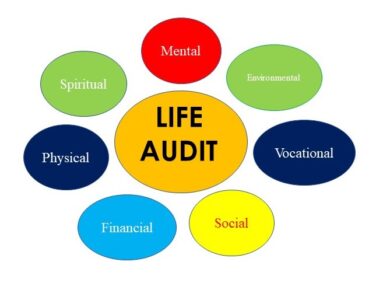Optimizing Efficiency: Unveiling the Power of Life and Business Audits
The other day, my mentor posed several thought-provoking questions that prompted deep introspection. Presented below are the questions that were posed:
- Are you happy?
- Do you think your actions are aligned with your goals?
- Is your life mostly dependent on vocation (business/profession)?
- If your life is happy, can you be more successful in your vocation?
- Would you still be happy if you have a good vocational life and not a happy personal life?
- Would you still be happy if you have a very good life but not good vocational or professional life?
These questions made me think. This led to a journey of self-reflection and embarked on writing this blog. And here is what we found.
We often find ourselves caught up in the daily grind, losing sight of our true-life and business goals. We become consumed by never-ending to-do lists, constantly striving to check off tasks without considering their larger purpose. In doing so, we inadvertently drain our energy and neglect the pursuit of a meaningful life and business that aligns all aspects with our core values.
So, at some point of time in our life, we should realign our actions with our values and goals. Even in vocation, at some point in time, it becomes inevitable to assess the direction of the business and the larger goals and motto of the entrepreneur. At this juncture comes Life Audit and Business Audit.
Generally, the term auditing is a systematic examination or review of records, statements, processes, systems, or activities of an organization. The primary purpose of an audit is to provide an independent and objective evaluation of an entity’s financial health, operational efficiency, internal controls, and compliance with applicable laws and regulations.
Similarly, a life audit is nothing but an introspection that involves assessing various aspects of our life, for us to get clarity, identify priorities and make intentional changes. This helps give us time to find out our happiness index associated with business and personal life. We will be able to evaluate and review different aspects of our life, including personal relationships, careers, personal life, health and fitness, personal development, financial status and emotional well-being.
By conducting a life audit, you can gain insights into areas that are thriving and those that require attention or changes. It allows you to make intentional choices, set new goals, establish priorities, and make adjustments that align with your values and aspirations. As the balance is crucial, though some aspects may take precedence. Ultimately, a life audit aims to help you live a more balanced, fulfilling, and purposeful life.
Life Audit and Deliberate Living

This essentially advocates for a mindful and proactive approach to life, where individuals are actively engaged in creating and shaping their desired outcomes, rather than simply reacting to external circumstances.
Deliberate living or conscious living can be achieved by assessing the current status. Without introspecting one cannot make deliberate choices that will lead to success aligned with core values and ultimately happiness.
Who should do Life Audit?
Conducting a life audit is essential if you want to strive for a better future or break free from the status quo, or overcome a rut. It allows you to gain an advantage by thoroughly examining your current circumstances, identifying areas that need improvement, and setting yourself up for a more fulfilling and successful tomorrow. By assessing and refining various aspects of your life, you can proactively work towards achieving your goals and creating a brighter future. Since, this help in evaluating various aspects of life, one could easily understand where their energy is drained unnecessarily. This could help in refocusing or reshaping life.
How to do the Life Audit?
As previously mentioned, this process entails deep introspection and self-assessment, which can lead to profound insights regarding one’s present condition or circumstances. By posing various inquiries, individuals can uncover revelations about their existing situation or state of being.
To unveil meaningful revelations, it is crucial to pose the right questions that prompt thoughtful introspection. By carefully selecting and asking pertinent inquiries, individuals can elicit the appropriate insights and revelations they seek.
 Asking the Right Question
Asking the Right Question
The art of asking timely and relevant questions plays a pivotal role in facilitating self-auditing, self-reflection, and the evaluation of one’s present state. By skilfully choosing the right questions, individuals can gain valuable insights into their progress towards their goals and assess whether their actions align with their deeply cherished values. Such introspection enables a deeper understanding of one’s position, aiding in course correction and ensuring alignment with personal aspirations and values.
How to ask the right question?
Asking the right questions at the right time brings out the best in many people’s life and business. Asking the right questions is indeed an art, and it can greatly contribute to personal and professional growth. Here are some considerations for asking effective questions:
- Clarify your purpose: Clearly define the purpose or objective of your questioning. What do you hope to gain or uncover? Understanding the intention will guide the type of questions that are asked.
- Be specific and focused: Ask questions that are clear, specific, and targeted. Avoid vague or broad inquiries that may lead to ambiguous responses. The more precise the question, the more focused will be the response.
- Encourage open-ended questions: Instead of asking questions that can be answered with a simple “yes” or “no,” open-ended questions are appreciable. These invite deeper thought and encourage the person to provide more detailed and meaningful responses.
- Practice active listening: Truly listen to the responses you receive. Devote your undivided attention, uphold steady eye contact, and refrain from interrupting. Pay attention to the words and the underlying emotions and nuances conveyed.
- Ask follow-up questions: When appropriate, ask follow-up questions to delve deeper into a particular topic or to seek clarification. This shows genuine interest and helps to explore the subject in more depth.
- Foster a safe and non-judgmental environment: Create a supportive and non-threatening atmosphere where individuals feel comfortable openly sharing their thoughts and insights. This helps to encourage honest and authentic responses.
- Reflect and learn from the answers: Take time to reflect on the answers received. Consider how they align with your goals, values, or areas for improvement. Use the insights gained to inform your self-auditing and self-reflection process.
Remember, asking the right questions is a skill that can be developed and refined over time. Maybe having a coach can indeed accelerate one’s ability to engage in self-audit and self-reflection continuously.
In conclusion, conducting a life audit can be a powerful tool to help you evaluate your current situation, identify your strengths and weaknesses, and make intentional changes that align with your goals and values.
A comprehensive life audit covers seven key dimensions: personal relationships, career, personal life, health and fitness, personal development, financial status, and emotional well-being. By honestly and objectively reflecting on these areas, you can gain valuable insights to make positive changes and improve your overall quality of life. Remember to be thorough, and introspective, and use the findings from your life audit as a guide for intentional and meaningful growth.


